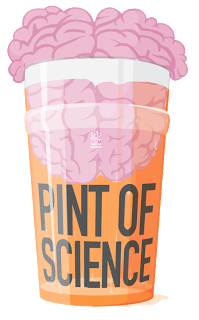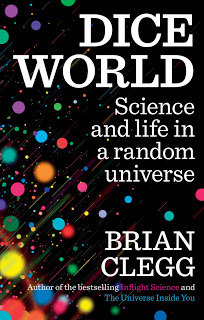Brian Clegg's Blog, page 120
May 1, 2013
Science in a pub? What can possibly go wrong?
 Science festivals are great. A brilliant opportunity to hear about exciting science with similar minded people - which is another way of saying fellow geeks. (Don't worry about this, by the way. Ever since Buffy the Vampire Slayer it has been okay to be a geek. Embrace your inner geek.) The only thing is they tend to be rather pompous, formal affairs in venues that would otherwise be used for events like weddings (think marquees and town halls) or for dull university lectures. However there's a shiny new festivalette that is putting the science in possibly the best conceivable place - the pub.
Science festivals are great. A brilliant opportunity to hear about exciting science with similar minded people - which is another way of saying fellow geeks. (Don't worry about this, by the way. Ever since Buffy the Vampire Slayer it has been okay to be a geek. Embrace your inner geek.) The only thing is they tend to be rather pompous, formal affairs in venues that would otherwise be used for events like weddings (think marquees and town halls) or for dull university lectures. However there's a shiny new festivalette that is putting the science in possibly the best conceivable place - the pub.It's called 'Pint of Science' and the organizers proudly say 'We are bringing science out of labs, seminars, lecture halls or classrooms to a place where everyone feels comfortable voicing their opinion over a pint.'
Another innovation is that it is on in three venues simultaneously: London, Cambridge and Oxford and in total there are 75 speakers and 15 pubs involved. What's not to love?
You can find out more at the website, imaginatively named www.pintofscience.com (if, like me you get a blank page, try a different web browser. The site seems incompatible with Safari). There are three strands: the brain, the body and biotechnology. And best of all it's free! (Though don't get too excited, you will have to pay for drinks.) It's important you book online as some of the events (in fact most of the London ones) are already sold out.
And the dates? Tinglingly soon as it's 14-16 May. Go forth and sciencify! And mine's a pint.
Published on May 01, 2013 00:24
April 30, 2013
Sexism watch
 A prison. Or possibly Barad-dûr.I am highly averse to sexism in any form. I confess I tend to watch out particularly for sexism that influences men, a) because I am a man, and b) because there are far more people ready to highlight sexism aimed at women.
A prison. Or possibly Barad-dûr.I am highly averse to sexism in any form. I confess I tend to watch out particularly for sexism that influences men, a) because I am a man, and b) because there are far more people ready to highlight sexism aimed at women.There is still work to be done in worming out existing sexist rules and regulations. But what I can't understand is why anyone would possibly introduce new sexist regulation.
It has just been announced that from November, male prisoners in England and Wales will be required to work harder for their privileges. What about female prisoners? Well, 'Officials are still working on possible changes to the privilege scheme for women prisoners.' I'm sorry, that's not good enough. What I find hard to believe is that the BBC doesn't comment on this, or that it can arise in the first place.
There is no excuse for any new policy being discriminatory. There should be no exceptions. As soon as anyone suggest a policy that specifies only one sex it should immediately be thrown out. Surely it wouldn't be hard to have this as a legislative protocol?
Of course there will be circumstances when something will have to be done to the rules applying to one sex to bring it into line with the other - that is desirable from the point of view of defeating sexism. But there is no way that something new and discriminatory should be allowed to go forward.
Image from Wikipedia
Published on April 30, 2013 00:27
April 29, 2013
Triple dip recession? Dip schmip.
 The only kind of triple dip that mattersIn my new book, Dice World, one of the subjects I cover is the way that statistics are misused by the likes of politicians and the media. For instance, the way that a politician can get all huffy about a policy having a negative effect on families with just two average earners - without pointing out that having two average earners puts a household in the top 25% of the country. Or the way the media can make a big thing about a statistic by using percentages, where the actual change is negligible. So, for instance, we might hear that pickpocketing has risen by 100%. Outrageous! Sack the chief constable! But if you hear that the number of incidents has gone up by one compared with the previous year (because there was only one instance of pickpocketing last year), the statistic has a rather different flavour.
The only kind of triple dip that mattersIn my new book, Dice World, one of the subjects I cover is the way that statistics are misused by the likes of politicians and the media. For instance, the way that a politician can get all huffy about a policy having a negative effect on families with just two average earners - without pointing out that having two average earners puts a household in the top 25% of the country. Or the way the media can make a big thing about a statistic by using percentages, where the actual change is negligible. So, for instance, we might hear that pickpocketing has risen by 100%. Outrageous! Sack the chief constable! But if you hear that the number of incidents has gone up by one compared with the previous year (because there was only one instance of pickpocketing last year), the statistic has a rather different flavour.A rather more subtle statistical misuse comes with all the fuss about whether or not the UK was about to enter a triple dip recession. As it happens we didn't - so the Chancellor could make all sorts of positive political noises about how his policies are correct. If we had, then no doubt the Shadow Chancellor would have jumped in yelling that this showed how bad the government's policies are, and how the country was going to the dogs. Yet either interpretation (and getting all excited about it being a triple dip) is another misuse of the statistics.
To respond this way to these tiny quarterly shifts is similar to sitting on a beach trying to decide whether or not the tide is coming in. A wave splashes onto the beach. 'The tide's coming in!' You cry. Then the sea recedes a little in the post-wave lull. 'No, the tide's going out!' Then the next wave arrives. 'The tide's coming in!' And so on. Very soon you would arrive at a triple tide afternoon.
Any data of this kind has both underlying trends and noise, the noise being random movements that do technically have a reason - but the reason is so complex, a messy mix of factors, that you might as well just regard it as chaotic noise and ignore it. Tiny shifts in GDP from quarter to quarter are just such noise. And should politicians or journalists choose to make much of these 'dips' or 'recoveries' (I was pleased to hear the BBC's Stephanie Flanders avoid this trap on the radio the other day) they are either deluded or trying to mislead us.
Published on April 29, 2013 00:28
April 26, 2013
Friday brain stretching

There's no day like Friday when we're more in need of a little assistance to get the brain going. So here's a little mental challenge to get you going for the day.
A man stands in the centre of a large field. There four horses in the field, one at each corner - a bay horse, a chestnut horse, a white horse and a black horse. For reasons we needn't go into, the man has to kill his horses.
If he must remain at the centre of the field, the horses stay at the four corners and he is a perfect shot, how can he make sure that none of his horses remain alive using only three bullets?
Don't read any further until you've attempted an answer. If you get one quickly, there are at least three solutions - try for another.
:
:
:
:
:
:
:
Last chance to consider your answer.
:
:
:
:
:
:
:
:
One solution is that only three of the four horses are his, so he only needs to shoot three to make sure that none of his horses remain alive. A second is that one of his horses was already dead of the terrible disease that was about to claim the others - hence his need to shoot them. A third is that the white horse was a chalk carving and had never been alive. There are more possibilities too.
Apart from the creative exercise in coming up with a solution, there is an interesting lesson here. We are conditioned from an early age to expect a single right answer to a problem. Often in reality there are many potential right answers, something that those whose careers depend on creativity forget at their peril.
Any thoughts on other solutions to the problem?
Published on April 26, 2013 00:26
April 25, 2013
Pounding the Scots
 'Is there enough cash in here?'It's not often I agree with George Osborne. In fact counting on the fingers of one hand would probably leave a couple over for a rude salute. Yet I have to say that I have some sympathy with the UK government's recent observations on what would happen to an independent Scotland when it came to currency.
'Is there enough cash in here?'It's not often I agree with George Osborne. In fact counting on the fingers of one hand would probably leave a couple over for a rude salute. Yet I have to say that I have some sympathy with the UK government's recent observations on what would happen to an independent Scotland when it came to currency.The SNP was quick to point out that the Osborne observations were little more than campaigning for a 'no' vote in the upcoming referendum (which I still think should be open the all of the UK, not just Scotland), and they were probably right. And yet I am all in favour of Scottish independence, but I can still see Osborne's point.
There seem to be four options available:
Go into the EuroKeep the pound in some kind of 'Sterling zone'Use the pound without official sanction from the UK Set up a separate Scottish currencyOf course until recently the Euro appeared to be the desirable option to the SNP (if you set aside the possibility that Scotland might not have been accepted) - but it has become a poisoned chalice. No one wants that anymore. The 'Sterling zone' is the SNP's new idea, but I really can't see why the rest of the UK would want it. All the evidence is that currencies across multiple sovereign states produce serious problems. Scotland could go for the unofficial pound, just as Panama uses the US dollar, but I suspect this is considered beneath the SNP's vision of a proud, independent Scotland. As for a DIY currency, the SNP is rightfully wary, because Scotland is sufficiently small for this to be a risky approach indeed. Even so, it may be the only real option.
What I was fascinated by was Alex Salmond's rather petulant 'If you won't go with a Sterling zone, we won't accept our share of the deficit.' It made me wonder just how that would work. Given a national deficit isn't like a building society loan, split after a divorce, how would it work? Who would decide who gets what if both sides are saying 'I don't want this bit'? It's an interesting conundrum.
Stereotypical Scottish image from Wikipedia
Published on April 25, 2013 01:06
April 24, 2013
3D without the headaches
 I am not a great fan of 3D movies. The 3D glasses are a pain when you wear your own specs, and the effects generally give me a headache while rarely seeming convincing. You won't see me rushing to buy a 3D TV any time soon either.
I am not a great fan of 3D movies. The 3D glasses are a pain when you wear your own specs, and the effects generally give me a headache while rarely seeming convincing. You won't see me rushing to buy a 3D TV any time soon either.However there is a very different side to 3D that I think has huge potential - 3D printing. When I visited the Dyson research centre with BBC Wiltshire one of the outstanding aspects was the way they made trial spare parts for their vacuum cleaners using 3D printers. But it is a very new area to most of us, which is why I appreciated having the chance to take a look at Chris Winnan's book. This provides a detailed overview of the state of play of 3D printing for the rest of us (as opposed to the Dysons of this world) and gives some very interesting thoughts on the way this market will develop.
Winnan suggests, I think absolutely correctly, that at the moment we are in the same state with home 3D printing as they were with the 'homebrew' microcomputers before the mass market off-the-shelf products - first the likes of Commodore 64 and Sinclair Spectrum and now the ubiquitous PCs and Macs - came along. So yes, at the moment, domestic scale 3D printers don't look like real products - but I have little doubt that they will and standards will arise.
Something else Winnan spends a lot of time on is how these printers can be used for fun and profit. After all, there is no point having a printer unless you need to print something, whether in 2D or 3D. This is an area that really gets the reader thinking. Some users will be designers using the 3D printer to produce artworks and models (one big example Winnan uses is all the miniatures bought by sci-fi enthusiasts), just as digital artists print their products now - but this is not the mass market. For the rest of us it is much more likely that we will print spare parts to replace broken bits (yes, even of Dysons), and will print new items other people have designed - so, for instance, instead of waiting for an object to come from Amazon in the post, you would download it to print, just as you now download an MP3 file. I suspect we would also print from scans, whether professionally done or cobbled together from phone camera software, just as phone can now generate quite sophisticated panoramic photos. (Imagine, for instance, a 3D model of your child's hand as a baby, complete with those tiny fingernails. Not my cup of tea, but I suspect it would be quite popular.)
As an ebook, 3D Printing has pros and cons. There's lots in it, and it really makes you think - but it's rather messily put together and you will probably find that you need to skip through pages of detail that aren't necessary to get the message. Having said that, though, the book is extremely well priced and very informative.
A few years ago I would have said 3D printers were valuable in R&D, but wouldn't find their way into the home any time soon. Chris Winnan has persuaded me otherwise and I, for one, can't wait.
Find out more with the book 3D Printing: the next technology gold rush available from Amazon.com and Amazon.co.uk.
Published on April 24, 2013 00:44
April 23, 2013
You can fool some of the people...
 As featured in hereAnd now for something completely different! It's... Monty... Hall's amazing problem. (If you aren't old enough to remember Monty Python, ignore that bit.) I have mentioned the Monty Hall problem before as a great example of the way our brains struggle with probability, but in researching my latest book Dice World, in which it inevitably features, I was lucky enough to be given some new information by my mathematical/computing friend at Oxford University, Peet Morris.
As featured in hereAnd now for something completely different! It's... Monty... Hall's amazing problem. (If you aren't old enough to remember Monty Python, ignore that bit.) I have mentioned the Monty Hall problem before as a great example of the way our brains struggle with probability, but in researching my latest book Dice World, in which it inevitably features, I was lucky enough to be given some new information by my mathematical/computing friend at Oxford University, Peet Morris.The problem (of which more in a moment) gained worldwide fame when it featured in the 'Ask Marilyn' column in Parade Magazine in 1990. The column was written by Marilyn vos Savant, whose claim to fame was appearing in the Guinness Book of Records as the person with the highest IQ in the world. (She was born Marilyn Mach, but despite appearing to have a phoney attempt to get the word 'savant' into her name, vos Savant was her mother's surname.) What was remarkable about the problem was that so many people - some of them mathematicians and professors - got it wrong. It is fascinating now to look back and see some of the letters published in Parade saying what a terrible mistake vos Savant made.
If you already know the problem, you might like to skip the next bit. It is based on the game that ended the quiz show Let's Make a Deal, hosted by Monty Hall. In the version described by vos Savant, the winning contestant is given a choice of three doors. Two have goats behind them, one has a car. It's a purely random choice, so when the contestant picks a door - say door 2 - there is a 1 in 3 chance they are right and a 2 in 3 chance they are wrong. The game show host now opens one of the other doors and shows a goat. Finally the contestant is given a choice. Would they like to stick with the door they have, or switch to the other unopened door? The question is, should they stick, should they switch, or does it not matter (probability wise) which they do?
The vast majority of people can see this is very simple. There are two doors available (because we can discount the one the host opened with a goat behind it). One has a goat, one has a car. So it's 50:50 which will be right. This means it doesn't matter if you stick or switch.
The vast majority of people are wrong. You will double your chances of winning if you switch.
Here's one explanation of why. Remember at the start, there was a 2 in 3 chance the car was behind one of the other two doors. All the game show host does is show you which of those two not to choose - but there is still a 2 in 3 chance the car is there. So you ought to switch. This only works because the game show host has information you don't. He selected a door he knew to have a goat behind it.
If, despite this argument, you don't find it convincing you are not alone. I remember when the problem was first publicized many of us wrote little computer simulations to prove the outcome. And it's right. Switch and you have a 2 in 3 chance of winning. But, as I mentioned, the most fascinating thing were the irate letters vos Savant received and reproduced. Here are some of my favourites (I have replaced names with initials to avoid any blushes). I particularly love the last one:
I'll come straight to the point... you blew it! [repeats the problem] Let me explain: if one door is shown to be a loser that information changes the probability to 1/2. As a professional mathematician, I'm very concerned with the general public's lack of mathematical skills. Please help by confessing your error and, in the future, being more careful. - R. S. PhD, George Mason University, Fairfax, Va.
You blew it, and you blew it big! I'll explain: After the host reveals a goat, you now have a one-in-two chance of being correct. Whether you change your answer or not the odds are the same. There is enough mathematical illiteracy in this country, and we don't need the world's highest IQ propagating more. Shame! - S. S. PhD, University of Florida
I have been a faithful reader of your column and have not, until now, had any reason to doubt you. However, in this matter, in which I do have expertise, your answer is clearly at odds with the truth. - J. R. PhD, Millikin University
May I suggest you obtain and refer to a standard textbook on probability before you try to answer a question of this type again? - C. R. PhD, University of Florida
Your logic is in error, and I am sure you will receive many letters on this topic from high school and college students. Perhaps you should keep a few addresses for help with future columns. - W. R. S. PhD, Georgia State University
You are utterly incorrect about the game show question, and I hope this controversy will call some public attention to the serious national crisis in mathematical education. If you can admit your error, you will have contributed toward the solution of a deplorable situation. How many irate mathematicians are needed to get you to change your mind? - E. R. B. PhD, Georgetown University
You're wrong, but look at the positive side. If all those Ph.D.s were wrong, the country would be in very serious trouble. - E. H. PhD, US Army Research Institute
Published on April 23, 2013 01:17
April 22, 2013
Take yer picture, guv?
 Image from MemotoWhen I was in my twenties I was a great photography enthusiast and though it was impractical with my usual SLR, I always had the intention (never fulfilled) of getting a pocketable camera which I would have with me at all times to capture those unexpected moments.
Image from MemotoWhen I was in my twenties I was a great photography enthusiast and though it was impractical with my usual SLR, I always had the intention (never fulfilled) of getting a pocketable camera which I would have with me at all times to capture those unexpected moments.Now, of course, most of us have this capability in the form of camera phones. Being able to take a photo at any time is a given assumption. When I broke my shoulder a couple of months ago, apart from asking after my well being/should they call an ambulance, the thing passers-by said most often was 'You should take a picture [of the paving slab]' - the assumption was that of course I would have then means to do so about my person.
There is a more extreme possibility, though - so called lifelogging. Take, for example, the soon to be available Memoto camera. At a mere $279 this is a tiny camera you clip onto yourself and it takes pictures every 30 seconds, which are then uploaded to an online store/memory structuring site.
My knee-jerk reaction was that this would be rather good - not really in the sense of lifelogging (who would really want to record '4 hours sitting in front of computer with occasional visit to the loo and to get a coffee'?), but rather so that those occasional moments when you do want a picture, you wouldn't have to do anything about it, it would just happen. But then reality set in. What are the chances that the thing you desperately wanted to capture would be in the 30 second gap, or that the ideal snap would be a) covered up by your jacket or b) taken at angle of 27.6 degrees?
So I probably won't be going down that route. But something inside me still desperately wants one...
Published on April 22, 2013 02:21
April 20, 2013
Read an extract from Dice World
Just noticed this rather fun extract reader thingie for Dice World:
Published on April 20, 2013 07:53
April 19, 2013
Chemistry in bad taste
 I have something for a fondness of the old school science fiction of the 1930s and 40s when new elements were invented at the drop of the hat.
I have something for a fondness of the old school science fiction of the 1930s and 40s when new elements were invented at the drop of the hat.Probably the most familiar is kryptonite (it was later redefined as an alloy, but started off as a classic 'element unknown to Earth science'). This is why I just love the sound of denatonium benzoate. Surely denatonium must be stronger than any known material, or has tendency to leave superheroes weak at the knees? But no, this is a compound that makes things taste extremely unpleasant - and it's the subject of my latest podcast for the Royal Society of Chemistry.
Wash your mouth out and hurry over to the RSC compounds site to see more on this incredibly bitter product that has the capacity to save lives. If you'd like to listen straight away, just click here.
Published on April 19, 2013 00:31



